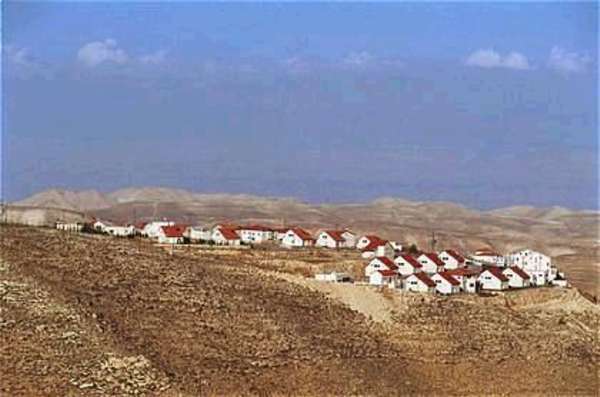
september 2004

Several options have been floated in Israel regarding understandings that may be reached with the United States. One possibility is to locate construction lines on the outer limits of a settlement's master plan, which tends to greatly exceed
the existing built-up territory.
Israel to seek new approach from U.S. on settlement blocs
By Haaretz Staff
Thu., August 05, 2004
"Political officials noted that an agreement might ultimately be reached with the Americans in practice without it being declared formally, which would enable construction amid standard protests."
Israel will ask the Bush administration for a different approach to the major settlement blocs in the territories and an understanding that Israel be allowed to expand them.
Negotiations are slated to begin in coming weeks between Israel and the United States on demarcation of construction borders for each West Bank settlement. Understandings were previously reached 18 months ago that West Bank construction would continue solely within a community's built-up area so that the overall territory does not increase. Numerous disputes led to an Israeli commitment to redraw the settlements' borders. The construction line will be defined through aerial photographs and joint Israeli-American discussion, and construction will be restricted to within those lines.
Israeli sources suggested that not all settlements would receive equal treatment; major blocs under consensus will be bolstered alongside implementation of the disengagement plan. A senior political official cited Ma'aleh Adumim, Gush Etzion, Ariel, Immanuel, Betar Ilit, and Modi'in Ilit as examples of blocs that will see continued construction beyond the present construction line.
Several options have been floated in Israel regarding understandings that may be reached with the United States. One possibility is to locate construction lines on the outer limits of a settlement's master plan, which tends to greatly exceed the existing built-up territory. Another option is to set a construction line that encompasses all settlements within a bloc instead of a separate zone for each. That way Israel could expand settlements, toward each other, so long as construction occurs within the line defined for the entire bloc.
Political officials noted that an agreement might ultimately be reached with the Americans in practice without it being declared formally, which would enable construction amid standard protests. Israel's objective is to have President George Bush's declared recognition of the settlement blocs translate into immediate action on the ground, not remain a statement helpful to Israel only during final status negotiations, the officials said.
A Defense Ministry team coordinated by Brigadier General Baruch Spiegel is working opposite U.S. Ambassador to Israel Dan Kurtzer to gear up for discussions. The teams are jointly preparing a large aerial map of the West Bank - a task that involves arriving at an agreed-upon database to enable a starting point for the talks. The map will also serve as the basis for negotiations on illegal outposts.
Another meeting took place this week between Spiegel and U.S. representatives on adapting the map to data in the administration's possession.
Defense Minister Shaul Mofaz last week banned further movement of trailers in the West Bank without Israel Defense Forces supervision. The order was issued after the government coordinator in the territories reported that some 70 trailers were recently placed illegally in known settlements and illegal outposts in the West Bank.
Meanwhile, Prime Minister Ariel Sharon appointed attorney Talia Sasson of the State Prosecutor's Office to review the entire issue of state support for illegal outposts. Sasson, an expert on Israeli law in the West Bank, will study the possibility of amending existing legislation so outposts can be disconnected from the water and electricity grids. Sasson will also look into whether the outposts receive funding from government ministries or corporations.
© Copyright 2004 Haaretz
From: Adib S. Kawar
